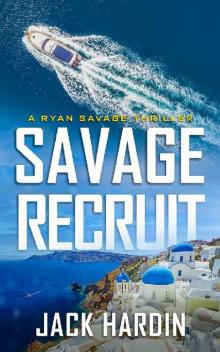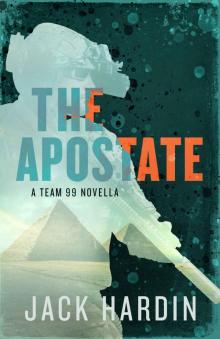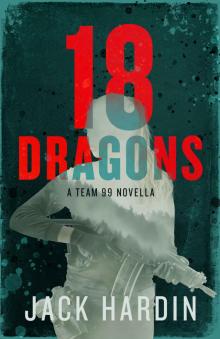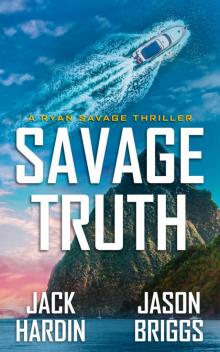- Home
- Jack Hardin
Breakwater Page 6
Breakwater Read online
Page 6
He stopped behind a lady with shoulder-length brown hair. She had a small backpack slung over one shoulder where a Power Rangers cup was tucked into a side mesh pocket. She was involved with her phone, pecking away with her thumbs.
“Abby.”
She turned toward Cruz, her face quickly showing alarm. Her forehead wrinkled in irritation, and when she spoke, it was through gritted teeth. “Victor, what are you doing here?” She glanced nervously back at her boy, who was kneeling in the dirt, singularly focused on finding relics from a distant past.
“Abby. Can we talk?”
“Here? You pick here, now, to talk?”
“You won’t answer my calls.”
She crossed her arms across her chest. “What do you want?”
Cruz looked over her shoulder to the boy. “I want to see him.”
“No.”
“He’s my son, Abby.”
“No,” she repeated. “You should have thought about that before you beat up that man. He’s still in a wheelchair in case you didn’t know.”
Cruz felt a surge of fury rise up within him. He swallowed hard. “How many times do I have to tell you I’m sorry? That man, as you call him, his name is Mario. And he has forgiven me. Why can’t you?”
“Now is not the time for all this.”
“Then when? I want to be a part of my child’s life.”
“I don’t want my son knowing that his father beats people until they’re paralyzed. I don’t want him knowing he has a father who went to prison.” She glared at him. “Things are different now. You scare me. I don’t want you around either one of us.”
“Abby, it hasn’t happened before or since. I love him, and I love you.”
She huffed indignantly. “Don’t ever say that again.”
“Give me another chance.”
“Why? So one day you can get angry enough to put one of us in the hospital?”
“No. That thing with Mario. It...it was different.”
And it had been different. For the better part of twenty years, Cruz had managed his anger. It was something that seemed to have always been there, nearly as far back as he could remember. It started to fester when he was six, after his father left and never came back. The man who he thought loved him left him rejected and abandoned, with an ever-diminishing hope that he might one day return. So the fights at school began and, along with them, too many detentions and suspensions to count. His mother, like a bird who could only sing one tune, would tell him to shape up and get his head right before he found himself somewhere he didn’t want to be. But he couldn’t stop. He was angry, and a boiling pot had to vent.
He was a sophomore in high school when a man whose name he couldn’t remember spoke at assembly one afternoon about taking control of your past and setting your own course. Only then did things start to change. Cruz listened, and though he left school that day unable to recall the specifics of the talk, he walked home with a fresh sense of hope about his future.
He joined a local gym, and the punching bag became his best friend. It was there that he took out his displeasure. It was there that he exercised his demons until he had nothing else to give, and he finished lathered in sweat, his knuckles often bleeding through the cloth wrap.
The workouts kept the violence at bay even if he never discovered how to pluck up its root. He graduated high school and, after moving from job to job, finally started an auto repair shop, which he ran successfully for nearly a decade. Until his landlord sold the building to a commercial developer. Cruz had been unable to find a new location suitable for his shop, and he was left doing small repair jobs for old customers out of a friend’s suburban garage. He became increasingly frustrated, desperate for something better to come along.
And it did. During a weekend trip to Miami, an old friend schooled him in the endless possibilities of stealing cars, stripping them, and parting them out to local buyers. The proposal held enough charm to compel Cruz to make the move from Orlando to Miami, and, instead of repairing cars, he went into the business of taking them apart.
And business was good. Soon he was making more in three days than he used to bring in over the span of three months. He met Abby, she moved in with him, and they were together for two years before she announced one day that she was pregnant.
Life was finally shaping into something worthwhile: money was easy to come by, he had a steady girlfriend, a child on the way, and was well respected among those in his small, tight-knit community.
There was, however, that perennial problem. When he moved to Miami, a decent gym was too far out of the way for him to attend regularly. He no longer had that outlet of release, and now all that was needed was the right set of circumstances to make his anger blow.
And blow it did.
One Friday evening, as dusk began to set over Florida’s largest city, Cruz found himself scouting a white Impala parked outside a tattoo parlor. He watched as the car’s owner went inside without bothering to lock it. He would be gone in three minutes, be hidden in a garage three blocks away in five, and have the car stripped and pieced out within thirty.
He walked down the street, tools in hand, watching for passing police cruisers when Mario Diaz—his competition—materialized from behind the donut shop adjacent to the tattoo parlor. Mario was closer to the Impala, and when he locked eyes with Cruz, he smiled a silent provocation. The car would be his.
But Cruz did not redirect; he did not back down. By the time he reached the car, Mario had already opened the door and was about to slide in when Cruz grabbed him by the shirt collar and yanked him around.
The men exchanged harsh words charged with malice and intent, neither man willing to back down. Mario got in Cruz’s face and released a torrent of insults amid a string of expletives. The Impala was now forgotten, and both men were seconds from blows when Mario changed tactics and informed Cruz that if he didn’t walk away immediately, then Mario would be paying Abby a little visit. He concluded that, when he was done with her, the baby might be an additional casualty.
Cruz’s anger had always hovered below the surface, boiling and sloshing along caverns deep within. It was Mario who pulled the plug and sent it spewing.
Cruz unleashed two decades of pent-up wrath into Mario’s body, cracking bones, tearing skin, and bruising flesh. When Mario finally lay in a pitiful pile at his feet, Cruz picked him up and folded his back across his knee. A half-dozen people poured from the tattoo parlor, but by the time three men pulled Cruz off Mario, it was too late. Mario’s back was broken.
Cruz was arrested and sent to jail, while Mario went to the hospital. During Cruz’s short stint in prison, Mario found religion. He came to visit Cruz and, even though the doctors said he would never walk again, offered forgiveness to the man who had taken away the use of his legs. He then apologized for his own provocation.
Now, as Cruz looked into the scornful eyes of the lady he once thought he would spend the rest of his life with, he saw only bitterness and hatred, all of it generated by, and directed toward, him.
“Please,” he said again. “I’ve dealt with it all. I’m not like that anymore.”
Her tone was defiant, if not combative. “It doesn’t matter,” she said. “It’s in you, Victor. You just don’t get rid of something like that.”
In the sand pit, the little boy jumped up and looked around for his mother. When his eyes fell on her, he dropped his plastic trowel and ran to her, sand falling off him like hundreds of tiny mites.
Abby stepped in front of the boy, trying to shield him from his father. “Nino, go back and play. Now.”
Nino clung to the back of her leg, and his head popped out from around her. He stared up at Cruz and contorted his face. “Who are you?” he asked. “Your eye looks creepy.”
“Nino!” his mother snapped. “Go play. Now.”
Cruz smiled down on the boy but did not speak to him.
“What happened to your eye?” Nino asked. But he was too busy ducking his mother’s
swats to wait for a reply. He let go of her leg and darted back to the sandbox, where the fake fossils quickly regained his attention.
Cruz silently agreed with the boy. His right eye was unsightly. Sometimes, when he looked in the mirror, he didn’t even recognize himself. He went into prison with two good eyes. But those first weeks inside, when you have to choose sides, he chose wrong. Five men assaulted him in the showers, and, after breaking three ribs and bruising a kidney that had him peeing blood for five weeks, one of them grabbed him by the back of the neck and slammed his face into the shower knob. His eyes took the brunt of the trauma, and it never did heal right. The lively green that still filled his left eye had disappeared in his right, replaced by a colorless and soulless white. He was now legally blind in that eye, and some had suggested he cover it with an eye patch. It didn’t help matters that his nose was swollen and misshapen—the consequence of too many schoolyard fights—and looked as if an entire hive of bees had worked it over with their stingers. He wasn’t going to make things worse by trying for a pirate look.
Abby looked away. “You need to go,” she said.
“Why does it have to be this way?”
“Why does it have to be this way?” Abby’s tone was ripe with indignation. She stepped closer to him. “I’ll tell you why. Because you won’t be honest with me about what you do.” Her eyes bore into his. “You said someone helped get you a lighter sentence. Fine. But you won’t tell me who. And you won’t tell me just what they have you doing. What is the work you do, Victor?”
“You know I can’t tell you that.”
And that was why, no matter what he said to Abby, he knew he would never get time with his son. He was not free. He was, for all intents and purposes, someone else’s slave. And how it happened was as unexpected as Miami snow.
He had not been in jail for two weeks when his name was called by a guard. He had a visitor. A dark man in a gray suit with a cold and determined disposition. A man he had never seen before spoke to Cruz about a man he had never heard of.
The agreement was simple: Cruz would be provided the best lawyer money could buy. His sentence, instead of a lengthy twelve years, would be reduced to a bearable three. He could put his mistake behind him and no longer concern himself with cellmates, handcuffs, and prison food.
The conditions of this Faustian bargain were straightforward. The nine years cut off Cruz’s sentence would now be in the employment of the man fronting the lawyer. Cruz would be paid well. He never did ask about the nature of the work. He didn’t have to. There was a clear and unspoken understanding that the work would be illicit.
He said yes.
Cruz had been released nearly a year ago now, and Abby still would not let him see his son. Not once did she visit him in prison, not even after the baby was born. So he would find himself driving by the daycare during pickup or parking down the street from their apartment so he could get a glimpse of three-year-old Nino playing outside.
He couldn’t tell Abby what he did. And you didn’t walk away from an agreement with Miguel Zedillo. Two others had tried, and both they and their families had disappeared like a bad magic trick.
Now, Abby stood before him, glaring.
“I owe him,” Cruz continued. “I wouldn’t even be standing here speaking with you if it wasn’t for him.”
“And yet, you won’t tell me who he is. You haven’t changed at all. Leave now, or I will call the police.”
Cruz raised his hands, conceding defeat. “Okay.” He took a final glance at his son and turned to walk away. He paused. “You know, a lot of fathers aren’t even interested in seeing their kids. I want to get to know mine. I never knew my father.”
“Then you shouldn’t have gotten locked up in the first place. When you can tell me what you’re involved with now, then maybe I’ll think about it. Until then, don’t come near us again.”
“I’m sorry I hurt you.” Then, with a final glance at his son, Victor walked away. He got back into his Tundra and wrapped his fingers tightly around the steering wheel until his knuckles were white. He breathed heavily through his nose as his chest rose and fell in great heaves of anger.
He closed his eyes. The old patterns of anger had diminished, but he could feel them begin to stir once again. He wanted to go back out to the playground and tell Abby that she couldn’t keep her son from him. He wanted to grab the boy’s hand, snatch him away, and take him to go get ice cream or to a movie. At very least he would teach him that the Power Rangers were weak and introduce him to real superheroes like Batman or Guardians of the Galaxy. But the truth was, he couldn’t do that. The courts sent him to prison and Nino to his mother.
Cruz started the truck and took a final look toward the sand pit. He drove out of the parking lot and forced himself to put his son out of his mind.
He had work to do.
Chapter Ten
It was a flawless January afternoon in Southwest Florida. The deep blue sky was cloudless, the salt-infused air a perfect seventy-seven degrees, weather that could make anyone but Tyler wish they were out on the water with a rod in their hands. In the twenty minutes since she had left Irene to suffer from the scourge of tiny children, Ellie had circulated a dozen profiles through her mind, trying to paint a mental image of the anonymous sender of her email. She had a fleeting vision of an old man in a wheelchair who lived on Ramen noodles and Diet Dr. Pepper and kept half a dozen cats in an ill-lighted apartment. She imagined a thirty-year-old with Cheetos-stained fingers who lived in the back of his mother’s house and stayed up playing Fortnite until four every morning. But profiling aside, she continued to question why she was sent to do the legwork. Why couldn’t the sender go visit Avi? And why get her involved at all?
Google Maps informed her that she had arrived at her location—the eastern end of an office complex whose architecture, with its insistent angles and sharply tapered roof lines, dated back to the 1970s. The one-story building before her was hemmed in with oleander, and a small yard at the front was bisected by a sidewalk leading to the front door. Several work vans filled parking spaces along the front curb, all but one of them with ladders tethered to their roof racks.
A realtor’s lockbox hung from the handle on the front door. Ellie tried the door and, finding it unlocked, stepped inside to a large reception area. High vaulted ceilings inset with half a dozen skylights drew in natural light from outside. A man in dusty jeans and a gray t-shirt was up on a scissor lift, taping the seams of newly installed sheetrock. The bare concrete floors retained the scars from old glue that had been scraped up and swept away. Ellie moved further in and caught the man’s attention.
He removed his trowel from the wall and looked down. “You need something?”
“I’m looking for Avi.”
“Avi?” He turned and pointed to a closed door on Ellie’s left. “He’s down that way somewhere.” She waved her thanks and turned the door handle as she went in. The room smelled powerfully of drywall compound, and Ellie noticed the walls had recently been sprayed with an orange peel finish. She passed up a bathroom and a small kitchen area before coming out into an open room where three men were busy installing new panels into the ceiling grid. A radio in the corner was blaring Tejano music, with its distinctive combination of accordion, bajo sexto, and drums filling the room. A short, thin man with dark hair and a well-trimmed mustache noticed her, and his brows lifted in some sort of recognition as if he had been expecting her.
She spoke loudly over the music. “Avi?”
He set down a stack of ceiling tiles before saying something to his co-worker, who went over to the radio and turned down the volume. He brushed his hands down his pants as he came over to Ellie. “You spoke with my wife?” His English was filtered through a heavy Spanish accent.
“Yes. I’m sorry to interrupt you on a job.”
He waved her off. “It’s not a problem. You were a friend of Nick’s?”
Ellie observed the men still working behind him. “Can we talk d
own the hall?” she asked. He indicated for her to lead the way. She waited until they were nearly at the front before speaking. “I understand that you worked with Nick on a couple of jobs?”
“Yes. We mostly do framing, and he was an electrician, but we crossed paths on a lot of jobs ever since he moved here. We had lunch together quite a number of times. He was a nice man. I was very sorry to hear he died.”
Ellie didn’t like being in the dark. Go talk to Avi Narrano….He can be trusted. Maybe if she knew who was behind the email, if she knew why Nick had been so anxious before he died, then she might feel a little better about being here. Finding out the truth would require a leap of faith, hoping it didn’t end with her sharing the same fate as Nick. The only way to move ahead was on the assumption that Avi could be trusted. A mental glimpse of a grieving Tiffany and a confused little Kayla prompted her next words. “Have you ever done any work for Breakwater?”
Avi’s furrowed brow revealed his surprise at the question. “Breakwater? Yes. But not for a long time. Why?”
Great question. She decided to deflect. “You don’t do any work for them anymore?”
“Oh, no.” He shook his head emphatically. “Not for...two years maybe? They were a good company for a long time. Back then they were called Garwood. Garwood Construction. But they changed owners, and the new ones—they started doing business in a way I didn’t like.”
“How do you mean?” she asked.
Avi scratched at the thin layer of stubble on his chin while he chose his next words. “A couple of times they asked me to invoice them for some work I didn’t do. Like once I installed some sheetrock for them in a new country club in Bonita Springs. They asked me to invoice them for some of the painting too. But I don’t do painting.”
“Why do you think they would ask something like that?”
“I think maybe they were having money problems and were trying to write more taxes off. But it made me uncomfortable. I was trying to get my citizenship and didn’t want any problems. They asked some other people I know to do something like that too, but none of them did it either.”

 Savage Recruit (Ryan Savage Thriller Series Book 8)
Savage Recruit (Ryan Savage Thriller Series Book 8) Bitter Tide
Bitter Tide Vacant Shore
Vacant Shore Breakwater
Breakwater The Apostate
The Apostate 18 Dragons
18 Dragons Lonely Coast
Lonely Coast Savage Truth
Savage Truth Broken Stern_An Ellie O'Conner Novel
Broken Stern_An Ellie O'Conner Novel Broken Stern: An Ellie O'Conner Novel (Pine Island Coast Florida Suspense Series) Book 1
Broken Stern: An Ellie O'Conner Novel (Pine Island Coast Florida Suspense Series) Book 1